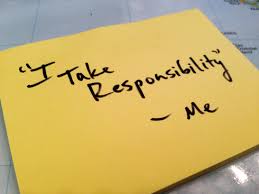Why don’t our leaders take responsibility?

Yesterday a friend and I were musing on Trust, and particularly on why so many political leaders are unwilling to ever admit a mistake, particularly on how they have been handling public health in the pandemic.
If they chose to take responsibility, it would give them a “reset”, an opportunity to rebuild trust where they have lost it.
We had no answers to why they would choose to shirk responsibility over and over, to us it seemed so obvious a thing to do.
However, I do have one or two thoughts on trust, credibility, accountability, responsibility, wrapping up with the fact that the more trust we have the less transparency we need.
No answers as to why so many leaders fail to take responsibility, but, I hope, plenty of reasons for all of us to choose to take actions that build trust in those we care about.
Taking Responsibility
Yesterday I also spoke with Kathryn Sheridan on the latest WhatComesNextLive show. Authenticity is core to who Kathryn is and the work she does with leaders around Sustainability. I asked her for her thoughts around this issue of Trust among political leaders.
Kathryn’s response focussed on the fact that Trust is built on Credibility, which itself is built on three things:
- Transparency
- Accountability
- Responsibility
This led me to several thoughts.
“The world is changed by your example, not by your opinion.” ~ Coelho
Put another way, as trust is built from credibility, don’t tell me how you feel about something, show me what you are doing about it, or “walk the walk, don’t just talk the talk”.
Oh, and the quote above comes from a blog that I recalled after talking to Kathryn, where she noted the hope she felt a couple of years ago when a group of young people in America stood up for gun control.
I couldn’t remember the name of the young woman at the front of this, but I do now, her name is Emma Gonzalez. My blog from March 2018, linking to the Coelho quote, is: “Emma, the world is changed by your example..” and features the speech I mentioned in the conversation with Kathryn.
Walk the walk.
Apologise. Please, simply apologise.
In May this year I wrote a blog called “Say Sorry“, highlighting this pervasive issue of leaders choosing to either never apologise, or to give a “non-apology” apology.
In an earlier blog I referenced Randy Pausch, who taught that there are three elements to a true apology:
- What I did was wrong.
- I feel badly that I hurt you.
- How do I make this better?”
Simple, yet so rare.
An apology in this form from an individual, a political leader, a business leader, provided it is truly authentic, is very powerful in creating a “reset”, an opportunity to pause and then to start to rebuild trust lost through whatever error, action or inaction brought forward the need for the apology in the first place.
So, if we all learn to and choose to apologise, the world would move forwards with more trust.
Choose accountability
So many times in the last few months we have heard political leaders promise they will hit goals and targets (eg Covid tests). A set number by a set date etc.
Brave, if they choose to be accountable, but so often they look to squirm and shirk this and do everything but be accountable and yes, therefore take responsibility.
Every time a leader fails to be accountable, every time they shirk responsibility, then we lose more trust in them
The more trust we have the less transparency we need
Trust is at the core of all relationships and once trust is lost it is very, very difficult to even partially restore it.
Up until around 2008 people in banking where proud of their profession. Almost overnight all trust was lost in banking and bankers, so now we have massive need for transparency, regulation, risk and compliance work and more.
All of this is time-consuming and very costly in time, money, resources.
Once we build trust in our relationships, whether personal or business, we actually need far less transparency.
This may seem counter-intuitive, but imagine a situation where someone your deeply trust is selling you something. Perhaps they may offer to give you the original invoice or valuation of the item to show you the sales price has credibility. Now imagine what your response may be. Perhaps it would be “no need, I trust you”?
